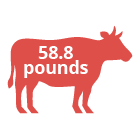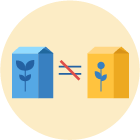Table of Contents
Veganism is more than a dietary choice—it's a lifestyle embraced by many. Adopting a plant-based diet comes with a range of benefits, both for personal health and the environment. There are numerous statistics and facts that highlight the positive impacts of going vegan. In this post, we'll explore 22 intriguing vegan facts that showcase the benefits for both individuals and the planet.
What Is Veganism?

Veganism is a lifestyle choice where individuals abstain from consuming meat, fish, poultry, and all animal byproducts including dairy, honey, and eggs.
It's beneficial to distinguish between veganism and vegetarianism. While vegetarians avoid meat, they might still consume animal byproducts like dairy and eggs. Vegans, however, exclude all products and foods derived from animals or involving animals in the production process.
Why You Should Go Vegan
Veganism is rising in popularity, and for good reason. You should consider going vegan because it’s:
1. A Path to Healthier Living
Embracing a well-balanced vegan diet often leads to an intake of more whole, plant-based foods, which are rich in essential nutrients. Unlike many other diets, this plant-based journey tends to steer clear of processed "junk foods" and reduces exposure to carcinogens, antibiotics, and hormones found in meat products. By nourishing the body with a myriad of vital nutrients and minimizing harmful substances, a vegan diet can pave the way for a longer, healthier life.
2. Better for the Environment

Conventional agriculture, particularly livestock farming, significantly burdens our planet. However, by curbing our meat and animal product consumption, we can mitigate these environmental impacts.
The ripple effect of more individuals transitioning to veganism can lead to a reduction in the strain industrial agriculture places on the environment. This shift not only promotes a greener planet today but also fosters a healthier earth for the generations to come.
3. Kinder to Animals
 There's no denying it: opting for a vegan diet means reducing the demand for animal products, and in turn, decreasing the number of animals subjected to harsh conditions for human consumption. Many animals raised for food or their by-products endure significant mistreatment. By eliminating animal products from your diet, you contribute to a reduction in animal suffering and take a stand for compassionate consumption.
There's no denying it: opting for a vegan diet means reducing the demand for animal products, and in turn, decreasing the number of animals subjected to harsh conditions for human consumption. Many animals raised for food or their by-products endure significant mistreatment. By eliminating animal products from your diet, you contribute to a reduction in animal suffering and take a stand for compassionate consumption.
Green Living: 22 Facts About Veganism
1. Beyond the Plate: A Lifestyle Choice
While it's commonly known that veganism entails foregoing meat and dairy, its ethos extends beyond the dining table. Many vegans also shun animal-derived products such as leather and wool, taking a stand against industries that exploit animals for human benefit.
2. Millions in the US Embrace Plant-based Living
A 2017 survey revealed that up to 6% of Americans identified as vegan, equating to approximately 19.7 million individuals. This sizable group chooses to eschew animal-derived food and products, opting instead for plant-based alternatives.
3. The Rise of Veganism
Driven by the environmental repercussions of industrial farming and heightened awareness of animal mistreatment, more individuals are gravitating towards veganism.
The 2017 survey showcased a notable uptick in this lifestyle choice, with the percentage of Americans identifying as vegan soaring to 6%, a significant leap from just 1% in 2014.
4. The Rise of Plant-Based Meats

For those keen on reducing animal consumption without parting ways with the taste of meat, a bounty of alternatives awaits. Numerous plant-based "meat" products, crafted from ingredients like soy, tempeh, chickpeas, and lentils, offer a hearty solution.
The recent years have seen the emergence of trailblazing companies like Beyond Meat and Impossible Brands. These innovators have made significant strides in concocting alternative meat products that remarkably mirror the taste and texture of real meat, making the transition to a vegan diet more palatable.
5. A Thriving Alternative Meat Market
The growing embrace of veganism is fueling a robust market for alternative meats, projected to reach an impressive $17.5 billion by 2027.
The trend is catching on mainstream too—Beyond Meat and Impossible Brands have carved a niche in nationwide chains like Carl's Jr., Burger King, and Dunkin' Donuts, reflecting a broader acceptance and demand for plant-based meat options.
6. Veganism for Cardiovascular Health
The absence of meat and dairy in a vegan diet often translates to lower intake of saturated and trans fats. Coupled with a rich intake of whole grains, fruits, vegetables, and nuts, veganism stands as a heart-friendly lifestyle. Research suggests that individuals on plant-based diets may have a lower risk of developing cardiovascular diseases compared to those on omnivorous diets.
7. Going vegan can be protective against certain cancers.

Vegans often reap a bounty of anti-inflammatory nutrients like antioxidants courtesy of a diet rich in fruits and vegetables. Additionally, the higher fiber intake commonly associated with plant-based diets is a boon.
Couple this with the established link between high red meat consumption and cancer, it's no surprise researchers advocate plant-based diets for cancer prevention. Remarkably, among various dietary groups, vegans boast the lowest rates of cancer, showcasing a significant health advantage of this plant-forward lifestyle.
8. Veganism's Environmental Footprint
The mounting concern over environmental impact is steering more individuals towards veganism.
Traditional agriculture is a hefty contributor to greenhouse gas emissions, exacerbating global warming. Moreover, it's often deemed unsustainable. Diminishing demand for meat products can lessen our food consumption's environmental toll.
A study by the Proceedings of the National Academy of Sciences of the United States of America projected that a global shift towards plant-based diets could slash greenhouse gas emissions by a remarkable 29-70%, underscoring the eco-friendly ethos of veganism.
9. The Hefty Cost of Beef
Producing a single pound of beef demands a substantial toll on our natural resources. As per EarthSave, the creation of one pound of beef requires an astonishing 2,500 gallons of water, 12 pounds of grain, 35 pounds of topsoil, and the energy equivalent to a gallon of gasoline. This stark data underscores the extensive resources funneled into meat production, elucidating a compelling reason for considering a shift towards more sustainable, plant-based dietary choices.
10. The Environmental Footprint of Beef
 On average, an American consumes about 58.8 pounds of beef annually. When factoring in the resource demands for a single pound of beef, the cumulative impact is staggering. This level of consumption translates to an individual's beef intake guzzling down 147,000 gallons of water each year. The numbers paint a vivid picture of the resource drain tied to meat consumption, offering a stark perspective on the potential benefits of reducing meat intake in favor of more sustainable dietary choices.
On average, an American consumes about 58.8 pounds of beef annually. When factoring in the resource demands for a single pound of beef, the cumulative impact is staggering. This level of consumption translates to an individual's beef intake guzzling down 147,000 gallons of water each year. The numbers paint a vivid picture of the resource drain tied to meat consumption, offering a stark perspective on the potential benefits of reducing meat intake in favor of more sustainable dietary choices.
11. Veganism's Aquatic Impact
Beyond terrestrial concerns, the consumption of animal products significantly affects ocean health.
Overfishing not only disrupts marine ecosystems but also contributes to ocean pollution, adversely affecting marine life. Additionally, fish farms pose environmental challenges. Opting for vegan alternatives can reduce the demand for detrimental fishing practices, offering a ripple effect of positive change towards healthier oceans.
12. The Future of Oceans Amid Overfishing
The trajectory of modern fishing practices casts a grim forecast: scientists predict that, if unchecked, oceans could be devoid of fish by 2048 due to relentless overfishing to satiate global demand.
Yet, a glimmer of hope remains. Another study posits a promising potential for ocean recovery within the same timeframe, contingent upon curtailing overfishing and other detrimental marine practices. This juxtaposition underscores the pivotal role of sustainable practices in steering the fate of our oceans, with veganism being a viable part of the solution.
13. The Many Shades of Veganism
Veganism embodies a spectrum of motivations. One such facet is "Climate Veganism," where individuals eschew animal products to mitigate their impact on natural resources. Others may be driven by health benefits, animal welfare concerns, or a harmonious blend of these factors. This diversity in veganism showcases its appeal to a broad range of individuals, each with their unique set of values and aspirations towards creating a positive change.
14. A Grim Reality for Livestock

A staggering 99% of US farm animals find themselves in the clutches of factory farms, establishments often criticized for prioritizing profit over humane animal treatment. This statistic unveils a harsh reality where the majority of animals destined for consumption endure overcrowding, improper feeding, and other inhumane conditions. This fact not only underscores a significant animal welfare concern but also presents a compelling argument for exploring alternative, more humane food production systems.
15. Celebrities Championing Veganism
The allure of veganism extends into the star-studded realm, with numerous celebrities embracing this lifestyle for varied reasons including animal welfare, health benefits, and environmental concerns. Notable figures like Joaquin Phoenix, Peter Dinklage, Woody Harrelson, and Ariana Grande have all publicly shared their choice to adopt a plant-based lifestyle. Their advocacy shines a spotlight on veganism, inspiring fans and the broader public to explore the myriad benefits of a plant-based diet. Whether it's through documentaries, social media, or interviews, these celebrities utilize their platforms to spread awareness and champion a cause close to their hearts, further propelling veganism into mainstream conversations.
16. Unanticipated Non-Vegan Ingredients
Beyond the apparent non-vegan culprits like meat and dairy, some seemingly innocuous processed foods harbor animal-derived ingredients, catching many unawares.
Take for instance gummy candies, jello, and marshmallows – they contain gelatin, a substance derived from animal skins, ligaments, tendons, and bones, making them off-limits for vegans. This fact underscores the importance of ingredient vigilance for those committed to a vegan lifestyle, as some animal derivatives can lurk in unexpected places.
17. Veganism for Weight Management
Veganism often transcends environmental ethos, drawing individuals keen on healthier living and weight management.
Typically, a vegan diet tends to be lower in calories compared to omnivorous diets, courtesy of its emphasis on fruits, vegetables, and whole grains. When paired with mindful calorie tracking, balanced macronutrient planning, and regular physical activity, a plant-based diet can be a conducive ally in promoting a healthy body weight. This aspect of veganism offers a tangible, personal benefit, making the lifestyle appealing for those looking to manage their weight while also aligning with broader ethical and environmental considerations.
18. The Non-Vegan Side of Alcohol
 Before toasting with that glass of wine or pint of beer, a bit of discernment is in order. The production of certain alcoholic beverages may employ ingredients and fillers incompatible with a vegan lifestyle. These include milk, cream, whey, casein, honey, eggs, and gelatin among others.
Before toasting with that glass of wine or pint of beer, a bit of discernment is in order. The production of certain alcoholic beverages may employ ingredients and fillers incompatible with a vegan lifestyle. These include milk, cream, whey, casein, honey, eggs, and gelatin among others.
The use of such additives, often to clarify or flavor the drink, underscores the necessity of due diligence for vegans keen on keeping their toast true to their dietary ethos. A quick check on the label or a visit to the brand's website can unveil whether your chosen brew aligns with vegan principles.
19. Planning for a Balanced Vegan Diet
Embracing veganism often demands a dash of dietary diligence to sidestep nutrient deficiencies. While the lifestyle boasts an array of benefits, the exclusion of animal products necessitates thoughtful meal planning to ensure a nutritionally replete diet.
Key nutrients that warrant attention include Omega-3 fatty acids, Iron, and B Vitamins—nutrients predominantly sourced from animal products. As such, a well-orchestrated vegan menu, possibly complemented by vegan-friendly dietary supplements, can help bridge any nutritional gaps.
Consulting a healthcare professional for personalized advice can also be a prudent step in aligning your vegan journey with nutritional adequacy, ensuring a healthful transition to, and continuation of, a plant-based lifestyle.
20. Navigating Plant-Based Protein Sources
Though abound in plant-based foods, proteins from such sources often come with a caveat—they're typically "incomplete." Unlike their animal-derived counterparts, many plant-based proteins lack one or more of the nine essential amino acids required to form a "complete" protein.
The key to unlocking protein completeness in a vegan diet often lies in combining different plant-based protein sources. A classic example is the duo of beans and rice; individually incomplete, but together they form a complete protein.
Yet, not all plant-based proteins follow this rule. Standout exceptions like quinoa and soy come armed with all nine essential amino acids, making them coveted complete protein sources in the vegan dietary realm.
21. Navigating Healthful Choices

The notion of veganism often conjures images of fresh fruits, vegetables, and nuts. However, the vegan food spectrum also hosts a swath of processed products, which may not align with the healthful image often associated with a plant-based diet.
It's a misstep to equate vegan with healthful universally. While enjoying processed vegan fare in moderation is perfectly fine, steering towards whole, minimally processed foods more often can significantly uplift the nutritional caliber of a vegan diet. This nuanced approach to vegan food choices promotes a well-rounded, nutrient-rich diet, aligning more closely with the wholesome essence that veganism often epitomizes.
22. Dietary Impact on Climate Change
In 2019, emissaries of the United Nations sounded a stark warning: humanity had a narrow window of 11 years to avert irreversible climate damage. Amidst this ominous forecast, a silver lining emerged — our dietary choices can wield significant influence over environmental outcomes.
Minimizing consumption of animal products was pinpointed as a potent consumer-driven strategy to curb environmental degradation. This underscores a compelling dimension of veganism that transcends personal health, extending into the realm of global environmental stewardship. Adopting a plant-based diet emerges not just as a personal choice, but a conscientious act harmonizing individual wellness with planetary health.


